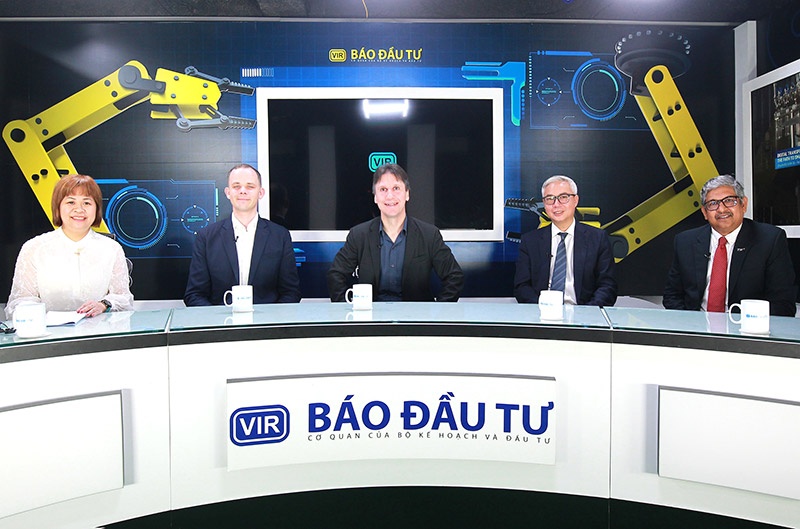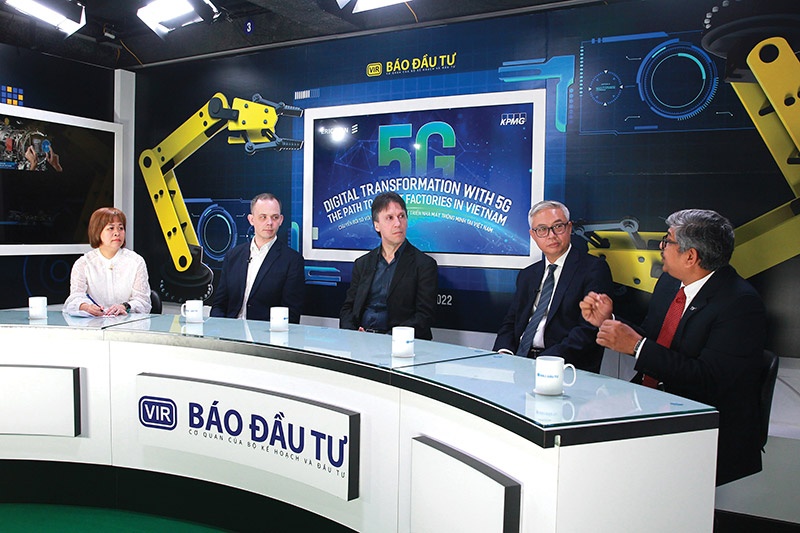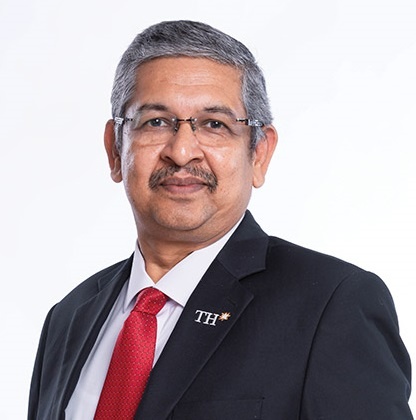Conducting smarter factory processes
 |
| Representatives of Ericsson, Business Sweden, TH Group, and the VBF discussed 5G-led factories, Photo: Chi Cuong |
At last week’s talk show on Digital Transformation with 5G –The Path to Smart Factories in Vietnam, hosted by VIR, industry leaders agreed that companies in different industries have to adapt to new technologies to compete and survive.
Denis Brunetti, president of Ericsson in Vietnam and Myanmar, said, “A wireless environment will make processes smarter, more flexible, and less static, which is increasingly critical in today’s factories.”
Brunetti explained that 5G-enabled facilities will benefit from sensors monitoring production processes and collecting data to feed back to machines and managers.
“This will greatly enhance the speed of operations, improve maintenance capabilities – through accelerated awareness or even notification before failures occur – and increase safety,” he said.
Seck Yee Chung, steering committee member of the Vietnam Business Forum’s Digital Economy Working Group, added, “Everybody understands they have to adapt, but it is not an easy process. I suggest companies should focus on the four As of awareness, accessibility, adaptation, and advancement.”
The talk show heard that, by automating operations, manufacturers can forge a more efficient production process that dramatically increases yields, improves product quality, and reduces waste.
Many other manufacturers have been making big gains with smart manufacturing, with Vinamilk, TH Group, Tan Hiep Phat, and VinFast being outstanding examples.
Ericsson and Hexagon have examined five different smart manufacturing use cases that will enable manufacturers to conduct their operations more efficiently: autonomous mobile robots, collaborative robots, digital twins, augmented reality, and also asset condition monitoring.
 |
However, challenges remain in smart factory development. According to Chung, one of the challenges right now is knowledge, with many technologies and new exciting opportunities out there.
“It is hard to know where to start. That is the stage where you need to assess your needs to see what is critical and who can help you. Small and big companies may struggle to deal with the issues. After carrying out assessments, decisions are then made and solutions implemented,” Chung said.
The participants agreed that when smart manufacturing is further accelerated, Vietnam has huge opportunities to become a smart manufacturing hub in the region. It is forecast that over two-thirds of global manufacturers will relocate to Asia-Pacific by 2025, with Vietnam attracting a high number of these manufacturing opportunities.
Vietnam has taken the right approach by deploying 5G in big cities and industrial areas first to bring digital transformation to manufacturing facilities, the panellists said, while the country also has policies prioritising the attraction of high-tech investment.
To facilitate the development of smart manufacturing, Chung further recommended that the government push forward with its digital and smart transformation agenda.
| Pavel Poskakukhin - Vice chairman, EuroCham’s Digital Sector Committee
EuroCham members have been using the latest technology at their disposal to address such issues as organisational structure, products, processes, and marketing. Specifically, our members are automating their back-office invoice processing, using AI on customer and supply chain topics, and leveraging big data to make business decisions. Smart factories, big data, and AI are increasingly used by our members. A few of these will be on display at the Green Economy Forum and Exhibition hosted by us in November. The event will bring together scholars, businesspeople, and students from Europe, Vietnam, and Southeast Asia to exchange ideas and implement innovative green European solutions in Vietnam. | |
| Tran Uyen Phuong - Deputy CEO Tan Hiep Phat
ICT-enabled tools have been the key drivers of our success over the past two decades. We continually strive to be at the forefront of new technologies as we know that being more efficient will give us a greater competitive advantage. We are currently in the middle of a 5-year plan to accelerate digitalisation across the whole organisation. One of the major projects has been implementing SAP Ariba, the business-to-business e-procurement and supply chain cloud solution. We were the first Vietnamese beverage company to do so when we went live earlier this year. SAP Ariba eliminates our last manual processes in this department. Our procurement team now have an easy-to-use interface to connect, collaborate, and manage the many suppliers that we deal with. It gives us a single source of truth and provides us with great data analytics that will help us to continually improve our procurement efforts. This has already resulted in a new scoring system to evaluate the suppliers that we use. We have been using SAP software for some time. It is already embedded in our finance, warehouse management, and production planning divisions. | |
| Arghya Mandal - CEO, TH Milk JSC, TH Group
TH Group currently accounts for 50 per cent of Vietnam’s fresh milk market share. Over the past 13 years, TH Group has been pursuing its set mission of “For the health of the community”. Through this mission, the group has become a trailblazer in applying high technology to livestock production in a bid to bring consumers TH true MILK-branded fresh and clean milk products that meet international standards. Digital transformation has always been considered a pivotal strategy of TH Group. We use state-of-the-art technologies and equipment, such as electronic chips fixed on the legs of cows to measure their health and also the milk conditions. All the information collected by the chipsets will be transmitted to computers for analysis. Thus, the cow raising process can be closely controlled, with problems regarding the cows being discovered very quickly. We even use music for the animals, which is scientifically said to help them when it comes to our required processes. At the farm, cows are milked by an automatic chain three times a day, after they have been bathed with clean water. There are many milking chains, with each able to simultaneously milk 120 cows. In total, each cow can produce 38-60 litres of milk per day. After coming out, the milk is carried to automatic quality-examining and filtering systems, and then cooled at below 4 degree Celsius. After that, the milk is transported to the processing facility equipped with European leading technology, with a daily capacity of about 600 tonnes of milk. | |
| Tran Thi Thu Trang - Chairman, Hanel Production and Import-Export JSC
Along with the rapid development of the Fourth Industrial Revolution, Hanel is constantly developing and applying more digital technology to its products. As the inventor and manufacturer of the Sasaki smart and multifunctional freeze-drying machine, our factory is applying a number of key technologies, including automation. The entire manufacturing cycle is digitalised for manufacturing management, research, and development. Connected and managed devices help control and detect abnormalities early, and have the ability to upgrade and update software remotely. We have developed new technologies in line with sustainable development goals. Some key technologies applied to the Sasaki technology will contribute to saving 83 per cent of electricity compared to traditional thermal drying technology, limiting the impact on the environment with closed, double-circulating freeze-drying technology and no emissions to the environment. Sasaki helps save resources through the integration of 3-in-1 functions with low-temperature drying technology, effectively retaining the nutrients of vegetables. The application of automation and digitalisation to products helps improve the efficiency of products and users. We always keep in mind to produce and supply products that are responsible for users, the environment, and society, and sustainability is our operational guideline and development orientation. We will continue to research new technologies to help save more electricity and help increase the value of agricultural products. |
What the stars mean:
★ Poor ★ ★ Promising ★★★ Good ★★★★ Very good ★★★★★ Exceptional
 Tag:
Tag:
Themes: Digital Transformation
- Dassault Systèmes and Nvidia to build platform powering virtual twins
- Sci-tech sector sees January revenue growth of 23 per cent
- Advanced semiconductor testing and packaging plant to become operational in 2027
- BIM and ISO 19650 seen as key to improving project efficiency
- Viettel starts construction of semiconductor chip production plant
Related Contents
Latest News
More News
- State corporations poised to drive 2026 growth (February 03, 2026 | 13:58)
- Why high-tech talent will define Vietnam’s growth (February 02, 2026 | 10:47)
- FMCG resilience amid varying storms (February 02, 2026 | 10:00)
- Customs reforms strengthen business confidence, support trade growth (February 01, 2026 | 08:20)
- Vietnam and US to launch sixth trade negotiation round (January 30, 2026 | 15:19)
- Digital publishing emerges as key growth driver in Vietnam (January 30, 2026 | 10:59)
- EVN signs key contract for Tri An hydropower expansion (January 30, 2026 | 10:57)
- Vietnam to lead trade growth in ASEAN (January 29, 2026 | 15:08)
- Carlsberg Vietnam delivers Lunar New Year support in central region (January 28, 2026 | 17:19)
- TikTok penalised $35,000 in Vietnam for consumer protection violations (January 28, 2026 | 17:15)


























 Mobile Version
Mobile Version